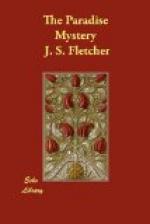“All these drawings,” he said, “are of old things in and about the Cathedral. Some of them, like that, for instance, that Jenkins shield, are of ornamentations on tombs which are so old that the inscriptions have completely disappeared—tombs in the Cloisters, and in Paradise. Some of those tombs can only be identified by these sculptures and ornaments.”
“How do you know, for instance, that any particular tomb or monument is, we’ll say, Jerkins’s?” asked Bryce, feeling that he was on safe ground. “Must be a matter of doubt if there’s no inscription left, isn’t it?”
“No!” replied Campany. “No doubt at all. In that particular case, there’s no doubt that a certain tomb out there in the corner of Paradise, near the east wall of the south porch, is that of one Richard Jenkins, because it bears his coat-of-arms, which, as you see, bore these birds—intended either as crows or ravens. The inscription’s clean gone from that tomb—which is why it isn’t particularized in that chart of burials in Paradise—the man who prepared that chart didn’t know how to trace things as we do nowadays. Richard Jenkins was, as you may guess, a Welshman, who settled here in Wrychester in the seventeenth century: he left some money to St. Hedwige’s Church, outside the walls, but he was buried here. There are more instances—look at this, now—this coat-of-arms—that’s the only means there is of identifying another tomb in Paradise—that of Gervase Tyrrwhit. You see his armorial bearings in this drawing? Now those—”
Bryce let the librarian go on talking and explaining, and heard all he had to say as a man hears things in a dream—what was really active in his own mind was joy at this unexpected stroke of luck: he himself might have searched for many a year and never found the last resting-place of Richard Jenkins. And when, soon after the great clock of the Cathedral had struck the hour of noon, he left Campany and quitted the Library, he walked over to Paradise and plunged in amongst its yews and cypresses, intent on seeing the Jenkins tomb for himself. No one could suspect anything from merely seeing him there, and all he wanted was one glance at the ancient monument.




